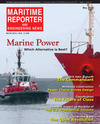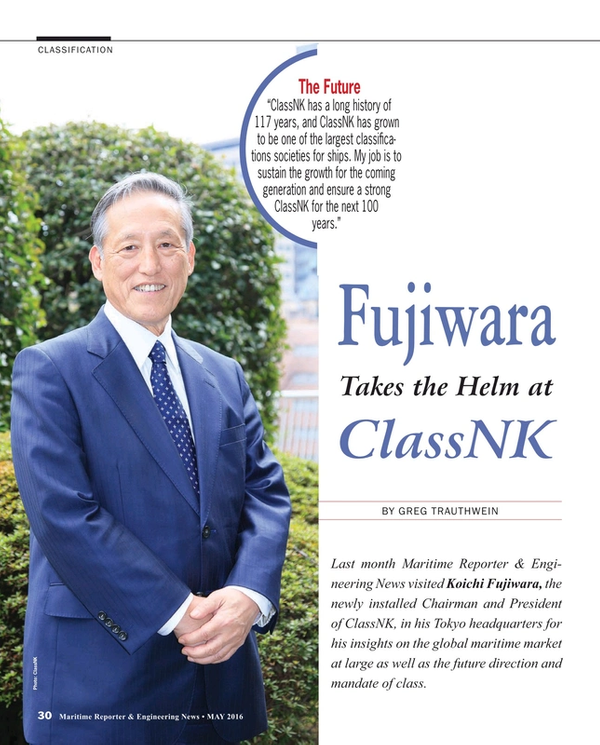
Fujiwara Takes the Helm at ClassNK
By Greg Trauthwein
Maritime Reporter & Engineering News visited Koichi Fujiwara, the newly installed Chairman and President of ClassNK, in his Tokyo headquarters for his insights on the global maritime market at large as well as the future direction and mandate of class.
With the global maritime market in the grips of a collective slump, the likes of which have not been seen since the energy crisis and resulting economic malaise of the mid 1970s, Koichi Fujiwara takes the mantle of leadership at ClassNK, one of the world’s largest and most influential classification societies.
“Today the shipping and shipbuilding markets are both very tough, which naturally is not a good situation for classification societies,” said Fujiwara. “My first priority is the stabilization of the ClassNK classification business based on the tough market conditions.”
ClassNK has been on a bull run over the past five years, when in 2011 a change in Japanese law lifted some business shackles which had restricted its ability to grow. Today, like its classification brethren around the globe, it is able to pursue a number of new and diverse opportunities to grow its brand. ClassNK today is focused both on securing its present and building its future, a future that increasingly will focus on the emerging importance and rapidly expanding collection, analysis and use of information gathered on shipping fleets globally: in other words, ‘The Internet of Things (IOT)’ and ‘Big Data’.
“After stabilizing the classification business, the next priority is for the future is to study and enable new technologies in the maritime field, such as Big Data, and to create new services that capitalize on and compliment these technologies,” said Fujiwara. Even though multiple shipping markets are down, it is incumbent upon classification societies to invest to ensure that it is keeping ahead of the technological curve. “It is a challenge to weather a difficult market and at the same time invest for the future, but that is what we must do.”
40 Years on the Job
While Fujiwara is new to the top spot at ClassNK, he has more than four decades of experience in the maritime field, lending to him and his organization a broad perspective in addressing the current market slump while simultaneously planning for the future and the inevitable market rebound.
“The hardest time for the shipbuilding industry was the late 1970s, immediately following the oil crisis, when there were almost no shipbuilding jobs for a few years,” said Fujiwara. But in the mid-1970s the shipbuilding market was substantially different, dominated by Japanese and European shipbuilders; as the shipbuilding powers of South Korea and China were still in their infancy. When the smoke cleared many of the European shipyards simply disappeared, and the Japanese industry was shaken but still standing. As the undisputed market leader it was able to help shipbuilding rebound by adjusting shipbuilding capacity.
The ensuing two decades saw the emergence of two major shipbuilding powers which would first challenge then surpass the Japanese industry, first in South Korea followed by China. The result today is a double edged sword in shipbuilding circles, as “we have a huge oversupply of capacity on the shipbuilding market” coupled with zero cooperation amongst the shipbuilders in helping to reduce capacity. “The shipbuilding market today is a survival competition,” Fujiwara said, noting that this is the first substantial down market and a very real challenge, particularly for the government controlled Chinese shipbuilders. In essence, the future of the shipbuilding market lies in the hands of what the Chinese government thinks the shipbuilding market should be, because international cooperation in regards to regulating capacity would be “impossible.”
“Maybe the new shipbuilding market will require 60 to 70 million gt, but today the capacity is more than 100 million gt,” said Fujiwara. “This is a huge oversupply.”
IOT: The Internet of Things
Fujiwara is adamant that continued investment by ClassNK – even in the face of a historic market slump – is necessary to ensure that the organization remains ahead of the technical curve and fully ready to respond when the market inevitably returns to black. And when Fujiwara looks to the future and investment, much of it boils down to IOT, the ‘Internet Of Things’. ‘Internet Of Things’ and ‘Big Data’ are handy catch-phrases to describe the revolution of data onboard ships and flowing ship to shore and back. But the focus on data is, of course, not centric to the data itself, rather focused on the collection, dissemination, analysis and final use of the information to make vessel operations more efficient, cost effective and safe. With the rapidity of IOT’s growth within the maritime sector, it is sometime not clear where precisely to prioritize investment, but one investment for certain will be the need for additional measures in the area of Cyber Security. Another hot-button topic surrounding IOT and Big Data is the prospect of unmmaned ships.
“Some would say that the goal of IOT is unmanned navigation,” said Fujiwara, “But I don’t think so. IOT is critical in the support of numerous operations, and we are now studying the matter with several shipping companies.” Fujiwara believes that at this point, IOT and Big Data is more about making incremental improvements in terms of efficiency and cost-effectiveness, with sweeping changes such as unmanned operations far in the future.
“It is up to the individual company to decide which software it intends to use for the best practices operation of the ship and communication with its customers,” said Fujiwara. “We are not the shipowner; we are not the shipbuilder; we are a service provider.” The classification society helps the ship owner evaluate their business, their operations, and define the fields and the areas where these companies might benefit from software or IOT solution. “We provide a base of their activities, and when necessary we evaluate the quality of the software technologies.”
Maritime Market Assessment
“Really, right now, only the tanker market looks strong. As you know many Japanese shipbuilders are switching to the tanker markets, so naturally this sector of our business will expand. Our business traditionally has been bulk carriers, but today it is difficult to see the recovery of the bulk carrier market anytime soon,” said Fujiwara.
“I’m afraid that those markets could be destroyed by oversupply (tanker and gas carrier), as they are smaller than the bulk carrier market and much more susceptible to oversupply concerns). But currently these markets are good, particularly when compared to the bulk carrier markets.
The container market is going through a tough time too … and combined with the bulk market this is the majority of the market for classification, too. In addition, the offshore market is very bad, too, but comparatively, the offshore business is very small for ClassNK.”
Read Fujiwara Takes the Helm at ClassNK in Pdf, Flash or Html5 edition of May 2016 Maritime Reporter
Other stories from May 2016 issue
Content
- Automated Skill Erosion page: 20
- ECDIS: The Quiet Revolution in Maritime Navigation page: 24
- Navico Makes its Commercial Push page: 26
- Fujiwara Takes the Helm at ClassNK page: 30
- ABS: Sharpening its Global View page: 34
- Meet the Future Surveyor page: 38
- Tech & Design Solutions for Modern Workboats page: 50
- Can Shipping Help Greece Ride out the Storm? page: 60
- Maritime Turkey Set for a Tailwind page: 62


